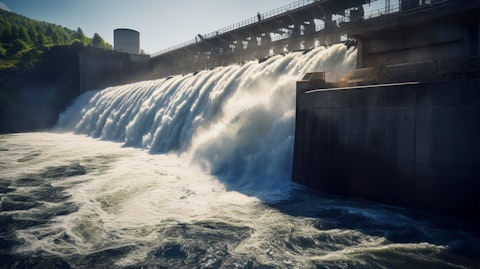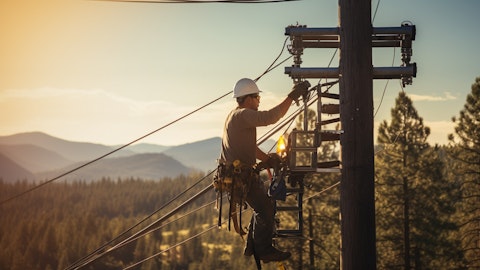Central Puerto S.A. (NYSE:CEPU) Q2 2024 Earnings Call Transcript August 12, 2024
Operator: Good morning, ladies and gentlemen. Welcome to Central Puerto’s Second Quarter 2024 Earnings Webcast. All participants will be in a listen-only mode. [Operator Instructions] After today’s presentation, there will be an opportunity to ask questions. Please note this event is being recorded. If you do not have a copy of the press release, please refer to the Investor Relations Support section on the company’s corporate website at www.centralpuerto.com. In addition, a replay of today’s call may be accessed by accessing the webcast link at the same section of Central Puerto’s website. Before we proceed, please be aware that all financial figures were prepared in accordance with IFRS and were converted from Argentine pesos to U.S. dollars for comparison purposes only.
The exchange rate used to convert Argentine pesos to U.S. dollars was the reference exchange rate reported by the Central Bank for U.S. dollars for the end of each period. The information presented in U.S. dollars is for the convenience of the reader only, and you should not consider these translations to be representations that the Argentine peso amounts actually represent these U.S. dollars amounts or could be converted into U.S. dollars at the rate indicated. Finally, it is worth noting that the financial statements for the second quarter ended on June 30, 2024 include the effects of the inflation adjustments. Also, please take into consideration that certain statements made by the company during this conference call and answer to your questions may include forward-looking statements, which are subject to risks and uncertainties that could cause actual results to be materially different from the expectations contemplated by industry remarks.
Thus, we refer you to the forward-looking statements section of our earnings release and recent filings with the SEC. Central Puerto assumes no obligation to update forward-looking statements, except as required under applicable securities laws. To follow the discussion better, please download the webcast presentation available on the company’s website. Please be aware that some of the numbers mentioned during the call may be rounded to simplify discussion. On the call today from Central Puerto is Fernando Bonnet, Chief Executive Officer; Enrique Terraneo, Chief Financial Officer; and Alejandro Díaz López, Corporate Invest — Corporate Finance and Investor Relations Coordinator. And now, I will turn the call over to Alejandro Díaz López.
Please Alejandro, you may begin.
Alejandro Díaz López: Thank you very much and good morning to you all. Thank you for joining us today on our earnings presentation where our management team from Buenos Aires, Argentina, is going to comment on our financial results of the second quarter of 2024. I would like to take a moment to review today’s agenda. I will begin the presentation by addressing shortly the main figures of the second quarter of 2024, followed by a quick update of the regulatory framework and relevant news. Then, I will show an overview of the Argentine energy sector, moving afterwards to our operational and financial results. Finally, at the end of the presentation we will be happy to address any questions you may have. Before going into a more exhaustive analysis of our financial and operational results, let me briefly review Central Puerto’s main figures for the second quarter of 2024.
The group’s installed capacity is 6,703 megawatts. And energy generation amounted to 4,985 gigawatt hours during the second quarter of 2024, increasing 5% year-over-year. So with these figures, Central Puerto keeps its leading position as a private power generation company, both in terms of installed capacity and energy generation through a well-diversified portfolio of asset and power generation technologies. Regarding our financial results; it should be noted that after the sharp devaluation that happened on December of 2023, the exchange rate kept almost flat during the first six months of 2024. While inflation, though decreasing since December of 2023, was significantly higher; this dynamic generated inflation in dollars in Argentina. Due to Central Puerto’s accounting methodology, all items in pesos must be adjusted for inflation to the end of the quarter, local currency, while the company reports its results in dollars by converting them at the end of the period official exchange rate; I mean, the so-called Central Bank at 3,500 exchange rates.
This causes a non-cash impact that affects positively or negatively as appropriate our financial metrics. Revenues for the second quarter of 2024 amounted to $168 million increasing 15% year-over-year compared to the second quarter of 2023 while adjusted EBITDA reached $46 million, shrinking 27% versus the second quarter of 2023. Net income for the period was positive in $8 million, decreasing 49% year-over-year. Finally, after debt consolidation as a result of recent M&A operation, loan repayments and dividend payments, net debt as of June 30, 2024 amounted to $229 million, a reduction of $58 million vis-à-vis December of 2023 showcasing a net debt adjusted EBITDA ratio of 0.9 times. Now let’s move to the most recent regulatory updates and relevant facts.
We have anticipated in our last call, the Resolution 58 issued by The Secretary of Energy on May 6, concerning unpaid receivables with CAMMESA. Regarding this resolution, Central Puerto finally accepts it on May 16, the payment mechanism by means of which trade receivables accrued in December of 2023 and January of 2024 were paid with Argentine Republic USD bonds at face value, while trade receivables accrued in February of 2024 were paid with funds available in CAMMESA’s bank account and transfer made by the national government to the Stabilization Fund. This resolution carried out a consolidated loss of approximately ARS20,459 million, or approximately $22.5 million. However, it should be noted that this resolution didn’t affect the ordinary course of business of the company, its payment capacity, nor its available financing options.
Regarding the situation of Piedra del Aguila hydro operation, on May 17, The Secretary of Energy issued Resolution 78 by means of which it extended the transition period upto December 28, 2024 as it is allowed in the concession contract. On June 14, The Secretary of Energy issued Resolution 99 which updated remuneration prices for energy and power sold in the spot market. Remuneration values increased 25% since June 1, 2024. So this price adjustment affects positively our revenues during the period under analysis but just for one month. Then, the Third Mile Generation Tender Process called TER-Conf [ph] was finally cancelled as it was determined by Resolution 151 issued by The Secretary of Energy on July 8. Finally, there was another price adjustment determined recently by The Secretary of Energy, although it has no impact on second quarter figures, it should be noted that a 3% increase on power and energy prices was granted since August 1 by means of Resolution 193.
Continuing with news and relevant facts, we have also anticipated in our last call, the investment made in the mining industry. Let me recall that on April 22, our subsidiary, Proener, entered into a common-share subscription agreement with AbraSilver Resource Corporation by means of which it was granted with the 4% interest in the share capital of the aforementioned company, which is the owner of the silver-gold project Diablillos, located in the northeast region of Argentina. With regards to the investment project currently in execution, let me tell you that in the case of San Carlos Solar Farm, construction agreements with Shanghai Electric Power Construction company were signed off March 27, and works began on July 31, being April of 2025 the COD.
As of today, all permits are in place, local vendors have already initiated their purchasing process, and the site is being prepared for construction and assembly. Also, equipment is being delivered to Argentina. In the case of Brigadier López combined cycle, as you may recall, Central Puerto is going to convert an open cycle thermal power plant with the gas turbine into a combined cycle of thermal power plant with addition of a steam turbine. The EPC supplier, Sacdeh [ph], received the notice to proceed on February 26, 2024 and the COD is scheduled for October 2025. As of today, works on the site have already started with the assembly of pipes and wires, communication system and water intake system. It is important to notice that both projects are on-schedule and on-budget.

Now let’s skip to the Argentine energy market picture of this quarter that will be shown on Slides 7 and 8. By the end of the second quarter of 2024 the country’s installed capacity reached 43,603 megawatts which means an increase of 0.5% or 198 megawatts compared to the 43,405 megawatts recorded as of June 30, 2023. The variation is a combination of the installation of new power facilities, and in addition of capacity adjustment and repowering of power plants that were already in operation. The positive variation of 198 megawatts is decomposed as followed; we have an increase of 533 megawatts of renewable sources of which 368 megawatt corresponds to wind farms, 50 megawatts of new power plants installed during the second quarter of 2024, 155 megawatts to solar plants of which 12 megawatts corresponds to new power plants installed during the second quarter of 2024, and 9 megawatts to biogas power plants.
Then we have a decrease of 335 megawatts in thermal sources which includes a positive variation of 527 megawatts of combined cycles and a negative variation of 862 megawatts of gas and steam turbines and diesel engines. Generation rose 6% during the quarter on a year-over-year basis, the growth was basically driven by nuclear and hydro generation. Renewable generation also rose but on a much smaller scale. Nuclear generation was significantly higher as a result of the reincorporation of Atucha II power plant which was in maintenance shutdown during the first half of 2023. This power plant resumed operation in August of 2023. Hydro generation rate of flow was remarkable, especially May with 60% of upfront [ph] year-over-year due to the outstanding increment in the flow of river, we have Uruay [ph] river with a growth of 500% Delimai [ph] river with 82% of road, and the Cushan Kuda [ph] river with the 45% rate of growth.
The higher supply of nuclear, hydro and renewables, lower thermal dispatch, and as a consequence, a lower fuel consumption was registered. 12% decrease was registered in equivalent natural gas million cubic meters. Focusing now on the demand. As you can see, electricity demand increased 2% to 33.4 terawatt hour compared to 32.9 terawatt hour regarded during the second quarter of 2023 which is basically explained by a rise in residential consumption due to weather conditions. On average, the temperature was 0.9 grades lower during the second quarter of 2024 when compared to the same period of last year. May was the coldest month during the second quarter of 2024 with temperatures 3.7 grade lower than the same month of 2023. Not surprisingly, residential consumption skyrocket along this single month increasing 29%.
Although the electricity trade balance during the second quarter of 2024 resulted in a net import situation, export were higher and imports lower during this quarter vis-à-vis the second quarter of 2023, thus reducing the net import balance. We now go to Slide 9 to our key operating indicators for the quarter. We can see that energy generated by Central Puerto rose 5% to 4,985 gigawatt hour compared to 4,762 gigawatt hour during the second quarter of 2023. In the second quarter of 2024, hydro energy generation from Piedra del Aguila increased 94% as compared with the second quarter of 2023 reaching 978 gigawatt hour as a direct result of higher levels of water available for generation which was a direct consequence of higher flow of river, as we have recently explained.
With regards to renewables, energy generation increased 5% in the second quarter of 2024 compared to the second quarter of 2023, being basically explained by the 48 gigawatt hour generated by Guañizuil solar farm, acquired in October of 2023. Speaking specifically of wind generation, it decreased almost 8% or 30 gigawatt hour, reaching 354 gigawatt hour during the second quarter of 2024. This is primarily due to the storm that hit Bahia Blanca in December of 2023 which impacted La Castellana II. Generation from La Castellana I was also lower due to maintenance works, carry on some blades. Regarding thermal generation, it decreased 7% in the second quarter of 2024 compared to the second quarter of 2023, basically as a result of lower dispatch of some units which was a direct consequence of higher hydro and nuclear aggregate supply in the system, as we explained earlier.
Regardless the lower dispatch, it should be highlighted the good availability figures for the quarter, both against the market average and against Central Puerto’s own metrics for the second quarter of 2023. Despite the lower thermal dispatch during this quarter, I mean the second quarter of 2024 for the whole system and Central Puerto; it should be noted the higher generation of Buenos Aires combined cycle, as a consequence of the maintenance program carried out last year. Now, let’s move to our revenues breakdown. As you can see on Slide 10, this amounted to $168 million in the quarter as compared to $147 million in the same period of 2023. It should be noted that the gap between inflation and devaluation in the period has positively affected the second quarter of 2024 figures at a non-cash level due to the company’s accounting methodology and the conversion into dollars using the end of the period official exchange rate; thus making the comparison with the second quarter of 2023 more complex to analyze.
Hence, having in mind this effect, the variation in revenues is a consequence mainly off a 14% or $10 million increase in spot sales driven by a higher dispatch of Piedra del Aguila hydro power plant, higher availability of some thermal units, especially in Central Castellana [ph], and also higher generation from Buenos Aires combined cycle. An 8% or $5 million increase in sales under contract, mainly explained by the recent acquisition of the solar farm Guañizuil and higher sales of cogeneration units; basically, we are speaking of La Castellana [ph] facility. Sales of our wind farms were lower due to lower wind generation, as we mentioned before, La Castellana II was hit by a twister in December of 2023 and there was maintenance work carry on some blades in La Castellana I.
Finally, there was a 42% or $3 million increase in steam sales driven by basically higher production levels in [indiscernible] facility, which is basically a consequence of higher availability of units and a higher demand from YPF. On Slide 11, we can see the dynamic of our adjusted EBITDA. During the second quarter of 2024 the group’s adjusted EBITDA amounted to $46 million, shrinking 27% or $17 million when compared to the $63 million in the same quarter of 2023. When analyzing the adjusted EBITDA, we can observe that the variation is mainly explained by the previously stated higher aggregate sales driven by spot sales and sales from the contract, and a positive non-cash effect on the gap between currency devaluation and inflation. Then we have a 4% or $2 million decrease in cost of sales, explained basically by a reduction of some production cost, compensations to employees, consumption of materials and spare parts, and forestry and forest production services expenses, being or partially upset by a negative non-cash effect on the gap between currency devaluation and inflation.
SG&A decreased 9% or $2 million, mainly by lower fees and compensation for services and lower taxes; again, being partially offset by a negative non-cash effect on the gap between currency devaluation and inflation. Finally, other operating results net in the second quarter of 2024 were lower than the second quarter of 2022 figures by 365% or $42 million, basically as a consequence of the impact of the Resolution 58. There were also lower interest from client and lower positive FX [ph] difference, and a negative non-cash effect on the gap between currency devaluation and inflation. Moving to the next slide; the consolidated net income. During the second quarter of 2024, Central Puerto’s net income amounted to $8 million, decreasing 54% or $9 million on a year-over-year basis.
The net income was positively affected by non-cash effects, including results generated by the change in purchasing power of the currency, variation in biological assets and lower DNA [ph]. These items were practically upset by lower funny [ph] effects, difference and interest. Then we have net financial results which decreased $1 million year-over-year, basically by lower interest earned and lower variation in the full value of financial assets. These items were partially offset by lower foreign exchange difference on financial liabilities, lower bank commissions, and higher share of the profit of associates. Finally, on Slide 13, we have the cash flow dynamic during the six months of 2024. Net cash provided by operating activities was $67 million during the six months of 2024.
This amount is mainly explained by higher income before income tax for the period and higher interest and from clients being or partially offset by tax payments. Then, the net cash used by investing activities was $13 million during the first six months of 2024. This amount is basically explained by the CapEx allocated to San Carlos and Brigadier López projects being partially offset by the sale of sound financial assets. Finally, financing cash flow was negative in $66 million during the first six months of 2024; this is basically the result of long-term loan repayments and interest payments, dividend payment being or partially offset by lower bank and investment account overdraft and long-term loan disbursement. Consequently, our cash position as of June 30, 2024 amounted to $5 million.
If financial assets are included, our total current liquidity amounts to $158 million. With this, I conclude the presentation. And now we invite you to ask any question to our team. Thank you very much for your attention.
Q&A Session
Follow Central Puerto S.a. (NYSE:CEPU)
Follow Central Puerto S.a. (NYSE:CEPU)
Receive real-time insider trading and news alerts
Operator: We will now begin the question-and-answer session. [Operator Instructions] And the first question today is coming from Martin Arancet from Balanz Capital. Martin, your line is live.
Martin Arancet: First, thank you for the presentation. And I have three questions, and I would like to run them one by one, if that’s okay. The first one probably is recent, so I don’t know if you might have an answer. But — last Friday, the government issued a resolution to auction again some hydro plants, including Piedra del Aguila, but to prioritize them. And — so apparently, you will have the control of the asset until the end of 2024 after which there should be a transition period to the new owner. I was wondering what do you think about this privatization process if you are interested in participating, probably for Piedra del Aguila or maybe another hydro plant? And also, if you consider that being the current operator of Piedra del Aguila, it gives you an advantage if you choose to participate?
Fernando Bonnet: Thank you, Martin, for your question. In fact, as you mentioned, the government made an extension or used all the timing that is establishing the contract transition period and the additional year award was until the December 24, 2024. And today, the government issued a new decree establishing an additional extension going from December 2024 for Piedra del Aguila to December 2025; so we will be the operators for Piedra del Aguila until December 2025. There are some in the decree that established some reduction in that period they performed the bidding process — as mentioned a new bidding process for a new 30 years concession. Before that December 2025, they could reduce 90 days that period but if they cannot mainly perform the process, we will be operating the hydro until December 2025.
Of course, as you mentioned, we are interested in continuing participating that bidding process, a new bidding process for another 30 years period for Piedra del Aguila. The decree doesn’t establish the process itself; they only call to The Secretary of Energy to start the process and to call the — or to start the process in 180 days by the — it doesn’t establish how we do the process — how we do the remuneration or the prices for these new concession periods will be a market pricing, so it will be a PPA. The revenue will be hydro, so we don’t know yet the details, and we need to wait until we see the details; how it will be — the new concession period. As you know, the actual concession period was like challenging because they established market prices at the beginning, and then after seven years of market prices, we will see a completely controlled prices going down and the concession was not the one that we imagined at the beginning.
So for the new period and how will be our participation in this new process, we need to see the details about the remuneration and all the details about this new option. But as to your question, we are very interested in participating if the conditions are the correct ones. And as we mentioned, of course, we know the asset in detail. So we think that we will be — we have an advantage there because we know the details, we have the people to operate that. So, of course, as we are there we have some advantages.
Martin Arancet: Thank you. Very clear. My second question then is, well, we learned that you will be interested in moving forward with a transmission project to take energy to the mining companies in the north of the country. I was wondering if you could tell us a little bit more of this project. And also, we heard something similar with YPF loose [ph]. I don’t know if they are two separate projects, or if you are considering probably moving forward together as they mentioned that they were trying to add other important participants in that project?
Fernando Bonnet: Yes. We are — as you know, we are looking for a new development in terms of renewal, we are one of the bigger players there. And we see that the demand already or the demand that we have right now is not enough to develop new projects; we are reaching a limit there because — in two sense, the limiting terms of transmission lines, but limits in terms of demand; the good contracts are already set, the good players and takers have already covered. So we think that the expansion need to come through — try to put or to take these new developments — renewable developments to the new demand; the new demand is right now the mining companies, and the lithium mining companies in the North. The problem is they don’t have alliance there because they are at 4,000 meters above the sea in the mountain; so we need to take the renewables or the energy produced by the renewables there, and the only way to do it is try to develop a new transmission lines in the North.
And we are trying to get up to collect all the demands in order to know it is strong enough to develop a project there which is a transmission line crossing Salta [ph] and some part of Catamarca [ph], specifically Salta [ph] province, but entering in a portion of Catamarca [ph] also. We know that YPF is — was at the beginning of the year talking about some process that could be senior or could be part of the project that we are thinking, but we don’t have the opportunity to talk with YPF yet in order to analyze the possible working together project or working together scheme; but we are open to do it, and perhaps it will happen if they have the similar idea that we have, it will happen. But we are in early stage yet because we are trying to collect the demand with — and our understanding is strong enough to move forward with the project that requires a lot of engineering analysis because it’s a challenging project.
So, we are collecting information and talking with the tough takers and talking with the province and try to develop the project.
Martin Arancet: Okay. Just a follow-up on that one. How would you recover the investment? Could you charge for the transmission line or would you have to recover that through the energy contract?
Fernando Bonnet: Well, the regulation is not already set. We construct the transmission line, we will need to have a new regulation scheme because right now there is not a clear regulation path to do it. But if we can build the transmission line, and we have the exclusivity to operate that transmission line, we will, of course, want to produce and to deliver our — also our renewable energy; so we will see that this will — implies a charge for the transmission line, and also charge for the renewable energy also. So we see a combination of businesses there; not only the transmission line by itself, and in case, the renewables going separate, we will see as a together business transmission line and the renewable procurement will be together for us.
Martin Arancet: Okay, thanks. My final question then, it’s — what are you expecting in terms of CapEx for the remainder of 2024 and 2025? And if you are considering tapping the debt market anytime soon?
Fernando Bonnet: The CapEx that we are expecting is the one that we have been carrying on, which is the DRL [ph] office closing of the combined cycle, and the project that we — the solar project that we are developing in Salta [ph] which is the San Carlos project. The two projects together we are talking about for the — via Lopez, $150 million; but more or less, we have less to expand around $90 million. And in terms of San Carlos, we are talking in about $15 million, and it’s kind of — like a $13 million — we could spend $13 million from now to the second or the third quarter of next year.
Martin Arancet: Okay, thank you very much. That’s all on my side.
Operator: Thank you. [Operator Instructions] And there were no other questions. And that concludes our question-and-answer session. I would like to turn the conference back over to Mr. Fernando Bonnet for any closing remarks.
Fernando Bonnet: Thank you to everyone for your interest in Central Puerto. We encourage you to call us for any information that you may need. Have a great day.
Operator: Thank you. This does conclude today’s conference. You may disconnect at this time. Have a wonderful day. Thank you for your participation.
Follow Central Puerto S.a. (NYSE:CEPU)
Follow Central Puerto S.a. (NYSE:CEPU)
Receive real-time insider trading and news alerts



